From Kites to Pongal: How India Celebrates January 14th
January 14th holds a special place in the hearts of Indians as it marks the celebration of harvest festivals across the country. This date coincides with Makar Sankranti, a day that signifies the sun’s transition into the zodiac sign of Capricorn (Makara). The celebrations are not only a reflection of the agrarian roots of India but also a showcase of its rich cultural diversity, values, and sense of togetherness. Let us take a journey through various cities of India to see how this day is celebrated in unique and vibrant ways, reflecting the love and unity of Indian culture.
The Significance of January 14th
The celebration of Makar Sankranti is deeply rooted in Indian culture and traditions. It marks the end of the winter solstice and the beginning of longer days, symbolizing hope, renewal, and prosperity. For an agrarian society, this time of year is particularly significant as it heralds the harvest season. It is a moment to express gratitude to nature, the sun, and the divine forces for a bountiful harvest. The festival embodies Indian values of love, sharing, and togetherness, as families and communities come together to celebrate with joy and enthusiasm.
1. Ahmedabad, Gujarat – Uttarayan

In Gujarat, 14th January is celebrated as Uttarayan, a festival synonymous with kite flying. The sky over Ahmedabad transforms into a canvas of vibrant colors as people of all ages participate in kite-flying competitions. The International Kite Festival, held in Ahmedabad, attracts participants from across the globe. Friends and families gather on rooftops, sharing delicacies like undhiyu, jalebi, and chikki while cheering for their kites. This celebration reflects the Gujarati spirit of joy, innovation, and community bonding.
2. Jaipur, Rajasthan – Kite Festival
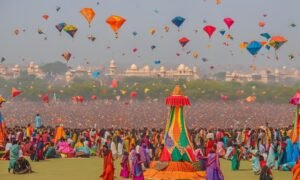
Similar to Gujarat, Jaipur also celebrates Makar Sankranti with kite flying. The Pink City comes alive with kites of all shapes and sizes dotting the sky. The rooftops are buzzing with music, laughter, and friendly competitions. Special feasts include gajak, til ke laddoo, and sweets made from sesame seeds and jaggery. This festival showcases the Rajasthani culture of hospitality and togetherness.
3. Varanasi, Uttar Pradesh – Spiritual Observance
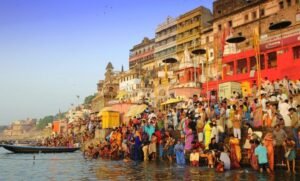
In Varanasi, Makar Sankranti is a deeply spiritual affair. Devotees gather at the ghats of the Ganges for a holy dip, believed to cleanse sins and bring prosperity. The city witnesses grand fairs, and temples are adorned with flowers. Kite flying is also popular here, adding a festive touch to the spiritual celebrations. This reflects the deep-rooted spirituality and cultural richness of the region.
4. Chennai, Tamil Nadu – Pongal

In Tamil Nadu, the 14th of January marks the beginning of the four-day Pongal festival. It is a time of thanksgiving to the Sun God and nature for a bountiful harvest. The highlight of the celebration is the preparation of Pongal, a sweet dish made from rice, milk, and jaggery. Homes are decorated with kolam (rangoli), and traditional dances and music add to the festive spirit. Pongal reflects Tamil culture’s emphasis on gratitude, family values, and connection with nature.
5. Hyderabad, Telangana – Sankranti
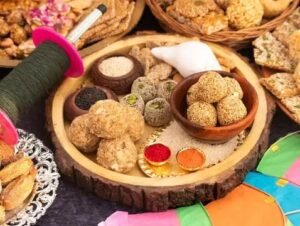
In Hyderabad, Makar Sankranti is celebrated with a mix of traditional and modern festivities. Kite flying is a popular activity, and the city’s skyline is dotted with colorful kites. Families prepare traditional dishes like ariselu, sakinalu, and sweet Pongal. Cultural programs showcasing folk dances and music are organized in various parts of the city. This celebration highlights the vibrancy and cultural fusion of Telangana.
6. Kolkata, West Bengal – Poush Sankranti
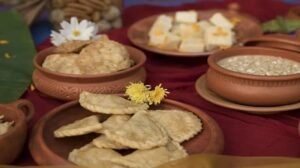
In Kolkata, the festival is known as Poush Sankranti and is celebrated with the preparation of traditional Bengali sweets like pithe, patishapta, and payesh. The Ganga Sagar Mela, held at the confluence of the Ganges and the Bay of Bengal, is a major highlight. Thousands of devotees take a holy dip and offer prayers to mark the occasion. This festival reflects the Bengali values of spirituality, culinary art, and community spirit.
7. Punjab – Lohri

Though Lohri is celebrated on the eve of January 14th, its festivities extend into the next day. In cities like Amritsar and Ludhiana, people gather around bonfires, singing and dancing to the beats of dhol. Traditional dishes like sarson da saag, makki di roti, and rewri are enjoyed with family and friends. Lohri symbolizes the Punjabi culture of warmth, joy, and collective celebration.
8. Bhubaneswar, Odisha—Makar Mela
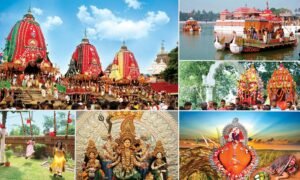
In Odisha, Makar Sankranti is celebrated with great enthusiasm. The highlight of the festival is the Makar Mela, where people gather to offer prayers and participate in cultural events. Special dishes like makara chaula (a mix of newly harvested rice, jaggery, and fruits) are prepared as offerings. This reflects Odisha’s deep connection with tradition and nature.
9. Mumbai, Maharashtra – Haldi-Kumkum and Kite Flying
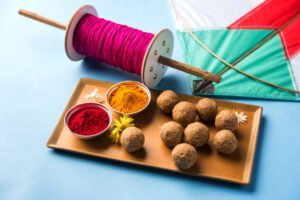
In Mumbai, the festival is celebrated with a blend of traditional and urban elements. Women organize haldi-kumkum gatherings, exchanging gifts and sweets. Kite flying is also popular in the suburbs, and tilgul (sesame and jaggery sweets) is shared with the phrase “Tilgul ghya, god god bola” (Take tilgul and speak sweetly). This celebration showcases the harmony and modernity of Maharashtrian culture.
10. Bangalore, Karnataka – Suggi Habba
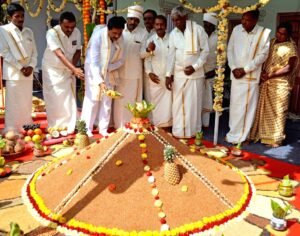
In Karnataka, Makar Sankranti is known as Suggi Habba, a harvest festival. Houses are decorated with rangoli, and cows and bulls are adorned with colorful ornaments. Traditional dishes like ellu-bella (a mix of sesame seeds, jaggery, and coconut) are shared among neighbors as a token of goodwill. This reflects the Karnataka tradition of fostering relationships and celebrating nature’s abundance.
Celebration of Unity in Diversity
The 14th of January is a day of unity in diversity, where every region of India celebrates the harvest season in its own unique way. From kite flying in Gujarat and Rajasthan to spiritual rituals in Varanasi and Tamil Nadu, the day is a vibrant tapestry of customs and traditions. These celebrations embody the essence of Indian culture—a harmonious blend of spirituality, gratitude, love, and togetherness. No matter where you are in India, Makar Sankranti is a time to come together, celebrate, and express gratitude for nature’s bounty.

